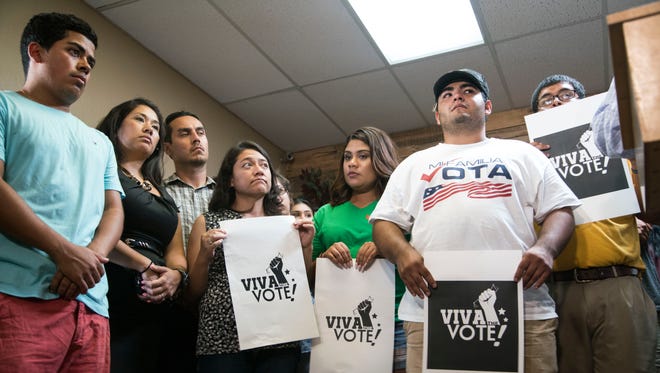Latino voters can take more power: Ruben Navarrette
By working across party lines and holding our allies accountable we won't be taken for granted.

SAN DIEGO — People like to talk about the growing power of the Latino vote.
It’s growing all right. Every election year — even now that there are an estimated 27 million eligible Latino voters — the Latino vote grows less relevant and less important.
Latinos have been a cheap date for the Democratic Party since the “Viva Kennedy” clubs of 1960. In the last 14 presidential elections, a majority of Latinos have cast their ballots for the Democratic candidate.
And for all their loyalty, in 2016, Latinos wound up with no one to take them to the prom. They’ve been pushed aside by Donald Trump and Republicans so they can pander to nativist whites. But they’ve also been ignored by Hillary Clinton and Democrats who are busy courting blue-collar whites.
Treated with contempt by both parties, courted in ridiculous and superficial ways, misled and manipulated by candidates and their campaigns, told that they have to choose the lesser evil, expected to have short memories when it comes to the offensive things that both candidates have said about immigrants and immigration, all while being written off by one party and being taken for granted by another, Latino voters are becoming more numerous but also more powerless.
Not that Latino voters haven’t come a long way in the last 50 years. We have.
In an attempt to chart that journey, the Corporation for Public Broadcasting presents the new documentary Willie Velasquez: Your Vote Is Your Voice this month on PBS.
10 reasons why Hispanics will hit Trump back in November: Column
The Mexican-American son of a butcher and a sweatshop worker, Velasquez grew up in San Antonio at a time when it was still segregated. He was a giant in the field of community organizing and voter registration who left his mark and then left too soon. He died of cancer in 1988, when he was only 44 years old. In 1995, he was awarded the Presidential Medal of Freedom, the nation’s highest civilian honor.
Velasquez had plenty of work to do. President Lyndon Johnson signed the Voting Rights Act of 1965, but it took 10 years for white local officials in the Southwest to begin to apply the law to Mexican-Americans who wanted to cast ballots. Hands that were considered more than qualified to pick peaches were not thought up to the task of picking candidates.
Narrated by playwright Luis Valdez and directed by Hector Galan, the documentary tries to tell in an hour a story with a wide historical arc. That story starts nearly 80 years ago with The Mexican Repatriation — the coerced return, during the Great Depression, of somewhere between 400,000 and 1 million people of Mexican descent from the United States to Mexico.
For telling stories that should be told and retold, and describing the darkness that Latinos confronted in the second half of the 20th Century, the film gets an “A” in history.
But for not explaining that the political narrative is so complex that Latinos are often allied with Republicans when it comes to redistricting and sometimes betrayed by Democrats on issues ranging from education to trade to criminal justice, the film gets a “D” in political science.
Velasquez liked to say, “Su voto es su voz” (“Your vote is your voice”). But he missed one thing: Even when Latinos do vote, if we give 80% of our votes to one party while special interests with opposing priorities give lots of money, our voices will be drowned out by the almighty dollar.
And when the election is over, and the votes have been counted, we might just wake up with even less power than we had before we went to the polls.
Insure California's undocumented immigrants: Raul Reyes
POLICING THE USA: A look at race, justice, media
So how do we fix this?
First, Latino voters have to be less beholden to the Democratic Party, more willing to support moderate Republicans who agree with them on issues, and more inclined to hold both parties accountable when there is abuse and neglect. Next, they have to inform themselves about the issues, and challenge themselves to know — not just what they believe but also why they believe it. And lastly, if they really want political parties to respect and fear them, they need to recognize that the empowerment process begins with introspection.
If we want to improve our lot, Latino voters need to take stock of how far we’ve come and how far we still have to go, keep doing what’s working and stop doing what isn’t, and accept that — in the end — we can’t depend on anyone but ourselves.
Ruben Navarrette Jr., a member of the USA Today Board of Contributors, is a columnist with the Washington Post Writers Group and The Daily Beast. Follow him on Twitter @RubenNavarrette.
You can read diverse opinions from our Board of Contributors and other writers on the Opinion front page, on Twitter @USATOpinion and in our daily Opinion newsletter. To submit a letter, comment or column, check our submission guidelines.